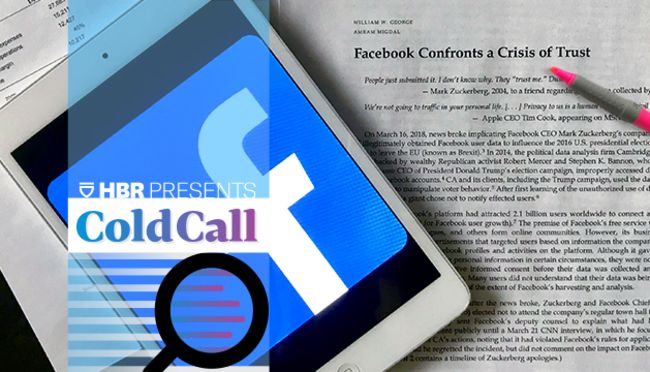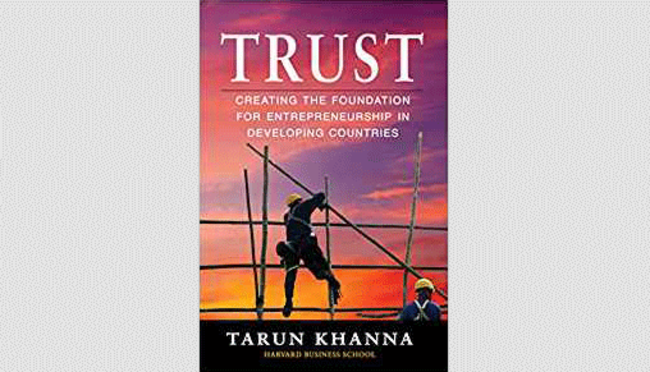Trust →
→

- 17 Jan 2023
- In Practice
8 Trends to Watch in 2023
Quiet quitting. Inflation. The economy. This year could bring challenges for executives and entrepreneurs, but there might also be opportunities for focused leaders to gain advantage, say Harvard Business School faculty members.

- 21 Oct 2022
- Research & Ideas
People Trust Business, But Expect CEOs to Drive Social Change
Companies should do more to confront climate change, labor market shifts, and racism, according to a survey of 14,000 people in 14 countries by the Institute for the Study of Business in Global Society and the Edelman Trust Institute. Is it time for more business leaders to step up?

- 20 Jan 2022
- Op-Ed
3 Steps to Help Companies Rebuild Trust During the Pandemic
Many workers feel battered and distrustful after almost two years of COVID-19 instability. But it's not too late for managers—even those who made damaging missteps—to repair these relationships, say Sandra Sucher and Shalene Gupta. Open for comment; 0 Comments.

- 14 Dec 2021
- Cold Call Podcast
How Japan’s Recruit Holdings Regained Trust after a Scandal
Recruit Holdings, an advertising media, staffing, and business support conglomerate was founded in Japan in 1960 by Hiromasa Ezoe. The company was built on the principle that the company should add value to society. But in 1988, Recruit hit rough waters when Ezoe sold 2.8 million shares in a subsidiary before it went public to 76 Japanese leaders in politics, business, and media. The "Recruit Scandal," as it was called, resulted in the resignation of Japan’s prime minister and his entire cabinet. Thirty years later, Recruit has become a global conglomerate, with $16 billion in sales in 2017. How did the company not only survive, but thrive after its insider trading scandal? Harvard Business School professor Sandra Sucher examines how Recruit’s unique corporate culture helped to restore lost trust in her case, “Globalizing Japan’s Dream Machine: Recruit Holdings Co., Ltd.," and her book, The Power of Trust. Open for comment; 0 Comments.

- 01 Sep 2021
- What Do You Think?
Can We Train for Trust?
A culture of trust can improve employee—and company—performance. But can leaders be trained to foster trust among those they lead? asks James Heskett. Open for comment; 0 Comments.

- 04 Aug 2021
- Research & Ideas
Worried About the Great Resignation? Be a Good Company to Come From
Some employees are just ready to move on. Rather than wave perks and bonuses at them, companies should focus on becoming great places to learn—and eventually leave, say Sandra J. Sucher and Shalene Gupta. Open for comment; 0 Comments.

- 07 Jul 2021
- Book
Good News for Disgraced Companies: You Can Regain Trust
Companies skilled at building trust focus on four key elements, say Sandra Sucher and Shalene Gupta in their book, The Power of Trust. Open for comment; 0 Comments.

- 04 Jun 2020
- Book
It’s Not About You: Why Leaders Need to Look Outward
By unleashing the full potential of their teams, leaders increase safety and inclusion in the workplace. Co-author Frances Frei discusses her new book, "Unleashed." Open for comment; 0 Comments.

- 13 Apr 2020
- Working Paper Summaries
The Bulletproof Glass Effect: When Privacy Notices Backfire
Consumers regularly encounter privacy notices explaining if and how their personal information will be collected, stored, used, and shared. Evidence in this study demonstrates that privacy notices, though designed to promote a sense of confidence that personal data will not be misused, can undermine consumer trust and decrease purchase intent.

- 04 Apr 2019
- Cold Call Podcast
Can Mark Zuckerberg Rebuild Trust in Facebook?
Bill George discusses his case study, "Facebook Confronts a Crisis of Trust," including why Zuckerberg handled the crisis as he did, the role of companies in protecting privacy, and the pros and cons of regulation. Open for comment; 0 Comments.

- 26 Nov 2018
- Book
Make Your Employees Feel Psychologically Safe
To do their best work, people need to feel secure and safe in their workplace. In a new book, Amy C. Edmondson details how companies can develop psychological safety. Open for comment; 0 Comments.

- 15 Nov 2018
- Book
Can the Global Food Industry Overcome Public Distrust?
The public is losing trust in many institutions involved in putting food on our table, says Ray A. Goldberg, author of the new book Food Citizenship. Here's what needs to be done. Open for comment; 0 Comments.

- 15 Aug 2018
- Book
Why Entrepreneurs Must Focus on Building Trust
Legal and social institutions that support entrepreneurs often aren't well established in developing countries. Tarun Khanna's new book explains how businesses can make up for that by building trust. Open for comment; 0 Comments.

- 25 May 2018
- Working Paper Summaries
Trust and Disintermediation: Evidence from an Online Freelance Marketplace
Intermediaries such as brokers, distributors, and agents all face a risk of disintermediation, when two sides circumvent the intermediary and thus avoid the intermediary’s fees. This study of a large online freelance marketplace finds that enhanced user trust increases this risk, alongside other contributing factors like being geographically near one another, having easily divisible jobs, and clients themselves having high ratings.
- 01 Jun 2015
- Research & Ideas
The Surprising Benefits of Oversharing
In a social media culture that encourages sharing of embarrassing information, revealing too much can benefit individuals but hurt businesses. New research papers from Leslie John and Michael Luca help explain why. Open for comment; 0 Comments.

- 14 May 2015
- Working Paper Summaries
Humblebragging: A Distinct-and Ineffective-Self-Presentation Strategy
To humblebrag is to make a boast sound like a complaint, as in the example, "It annoys me when people mistake me for a celebrity." Humblebragging is so common in social media and everyday life that one could assume it is an effective self-promotional tactic. Yet five studies show this tactic tends to backfire because it makes other people doubt the sincerity of the humblebragger. Indeed, straightforwardly bragging is the better way to go. The authors of this paper also examine the psychology underlying humblebragging as an impression management tactic and highlight the role of perceived sincerity in impression management. Closed for comment; 0 Comments.
- 09 Dec 2013
- Research & Ideas
Cultural Disharmony Undermines Workplace Creativity
Managing cultural friction not only creates a more harmonious workplace, says professor Roy Y.J. Chua, but ensures that you reap the creative benefits of multiculturalism at its best. Closed for comment; 0 Comments.
- 13 May 2013
- Research & Ideas
How to Spot a Liar
Key linguistic cues can help reveal dishonesty during business negotiations, whether it's a flat-out lie or a deliberate omission of key information, according to research by Deepak Malhotra. Closed for comment; 0 Comments.
- 25 Jun 2012
- Research & Ideas
Collaborating Across Cultures
Learning to collaborate creatively with people from other cultures is a vital skill in today's business environment, says professor Roy Y.J. Chua, whose research focuses on a key measure psychologists have dubbed "cultural metacognition." Closed for comment; 0 Comments.

Have We Lost Sight of Integrity?
Elizabeth Holmes. Sam Bankman-Fried. George Santos. The list of leaders caught trying to con the public keeps getting longer, often with dire consequences, says Bill George. Do we no longer value the truth?